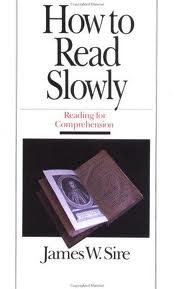How To Read Slowly by James W. Sire
I love this book! What's not to love in a book about reading? The authour's purpose is to help us read better for greater comprehension. He says "Our goal in reading carefully is not only to understand what is being said explicitly but to see why it is being said. We want to learn to recognize the world views of writers and speakers, and thus to know what their basic assumptions about life really are. It will help us decide what kind of attention to pay to their comments or proposals no matter how modest or immodest."
The second chapter deals with non-fiction, the next with poetry, then fiction and it wraps up with a chapter called "A Time To Read: Knowing What To Read and When". What I love about this book is that it leads you through reading exercises and explains point by point what to look for. Sire is a good teacher whose book, according to the publisher's blurb, "has been widely used in higher education classrooms to reach reading comprehension". I found myself underlining a lot of it because there is so much that is pertinent and helpful. I want to read it a few times and start applying its principles to my reading until it becomes second nature. Not that it's all new ideas; at one time or another you've probably heard most of it before, but if you're anything like me you've probably forgotten some of it too. This author has a clear and logical way of getting his ideas across that is both highly readable and very effective.
The chapter on poetry was fun. Sire quotes a few short poems and has us read them several times looking for specific things. As you follow his direction the poem begins to open up and you see more in it than you did on the previous reading. He compares understanding a poem to looking at blueprints to understand a building: "...and just as an architect or building engineers know what to look for when they examine the building, so do good readers." This is what he's teaching us: what to look for. He gets into metrical structure, image and sound structure, etc, but not deeply, just enough to help us unscramble the riddles poetry often presents. I found this the most interesting and practical chapter of the book.
In the chapter on fiction the topics of plot, character, theme, point of view, tone and style are looked at, again not in depth but enough to be helpful. He doesn't focus on any particular aspect of fiction but says "There is no point in paying close attention to details if we fail to experience the whole work and, as it were, to perceive it at a glance - to drink it in, savor it's succulent tastes and smells, feel its philosophy of life, see its vision of reality and come to grasp more fully what it means to be human.".
James Sire is a Christian and makes references to that throughout the book. He wants Christians to be better readers, more aware of what is going on in the world and what writers are saying about it. But whatever philosophy of life you hold to, this book is for any and all readers who want to get more out of what they read. As he puts it: "I don't expect any reader to imitate my own lifestyle nor to adopt point for point the precise values that I would at my best affirm. But I do want to announce at the beginning that I love reading and would like to help others love it too - and do it better."
I don't agree with everything Sire says and some of his comments seem a little stuffy but that's not hard to overlook when you consider how very useful his teaching is. I hope I haven't made it sound dry because it really isn't and at only 168 pages there isn't time to get too academic so it moves along and stays interesting. I expect this book to make a real difference in how I read. I recommend it to everyone.
1 day ago





0 comments:
Post a Comment